- University
- Governance
- CHAIRMAN OF THE BOARD-RECTOR
- Academic council
- Assistant to the Chairman of the Board-Rector
- Advisor to the Rector on public relations
- Advisor to the Rector on administrative and legal issues
- Advisor to the Rector for youth affairs
- Human resource management
- Documentation Support and Archive Department
- Department of Economics and Finance
- Department of Economic Work
- Information Security Officer
- MEMBER OF THE BOARD - VICE-RECTOR FOR ACADEMIC AFFAIRS
- MEMBER OF THE BOARD-VICE-RECTOR FOR RESEARCH AND INTERNATIONAL RELATIONS
- Department of science
- Department of research coordination
- Commercialization Department
- Scientific сenter «Archeology and еthnography»
- Scientific center «Korkyt studies»
- Scientific centre «Mustafa Shokai»
- Laboratory of engineering profile «physicochemical methods of analysis»
- Scientific and educational center for chemical and biological research named after T.D.Kuanyshbaev
- Botanical garden and greenhouse facility
- Сhief editor
- Department of international relations
- Scientific and technical library
- Department of science
- MEMBER OF THE BOARD - VICE-RECTOR FOR SOCIAL AND EDUCATIONAL WORK
- Department of Social and Educational Work
- Department of Recruitment and Career
- Employers' Council
- Master's Degree itinerary for the 2024-2025 academic year
- Work plan to increase the number of international students for the 2024-2025 academic year
- The annual work plan of the Institute of Artificial Intelligence for career guidance for the 2024-2025 academic year
- CV template
- «Upgrade» platform
- Media center
- Psychological Support Center
- Medical Center
- The Center «Assembly of People of Kazakhstan»
- Palace of students
- Museum
- Sports complex «Seykhun»
- Student Ombudsman
- Council of veterans
- «Кorkyt ata endowment» сorporate fund
- Alumni Association
- BOARD MEMBER - VICE-RECTOR FOR STRATEGIC DEVELOPMENT AND IT
- CHAIRMAN OF THE BOARD-RECTOR
- Mission of the University
- Development Strategy
- Corporate governance
- Board of Directors
- Corporate Secretary
- Corporate events
- Corporate documents
- Meetings of the Board of Directors
- Committees of the Board of Directors
- Report on the activities of the Board of Directors
- Board
- Board meetings
- Internal audit service
- Anti-Corruption Compliance Service
- Decisions of the sole shareholder
- Accreditation
- Positions in the ratings
- Register of documents
- Graduates
- Structure
- Blog Rector
- Material and technical base
- Personnel reserve
- Quality Assurance policy
- Summary risk map
- Governance
- Education
- Science
- Students
- International relations
- Media
- SDG
- Sustainable development policy
- Measures for the implementation of policies in the field of sustainable development goals
- Mechanism for implementing the sustainable development policy
- Specialist in sustainable development goals
- Scientific projects
- International Center for the Study of Ecosystems of the Aral Sea Region
- Educational programs on sustainability
- Commissioners for Sustainable Development
- Center for Inclusive Education
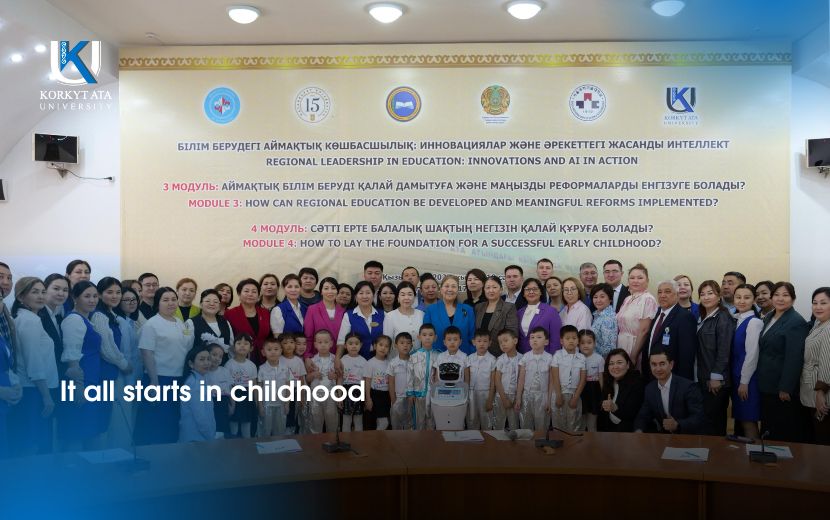
It all starts in childhood
The second day of the republican two-day seminar on “Development of Regional Education and Implementation of Key Reforms,” organized by Korkyt Ata Kyzylorda University in collaboration with Nazarbayev University, opened with a modular session titled “How to Lay the Foundations for a Successful Early Childhood?”
The event began with an opening speech by Dana Abdrasheva, Vice-Rector for Academic Affairs at Korkyt Ata Kyzylorda University, who highlighted the importance of the issues under discussion. The seminar was then led by Galiya Dauletova, Head of the Department of Quality Assurance of Education in the Kyzylorda Region under the Ministry of Education of the Republic of Kazakhstan.
Zhanyl Zhontaeva, Director of the Department for Advanced Training Programs at Nazarbayev University's Graduate School of Education, offered her insights on the seminar’s theme and underscored the relevance of integrating artificial intelligence (AI) in modern kindergartens in line with current legislative norms and societal needs.
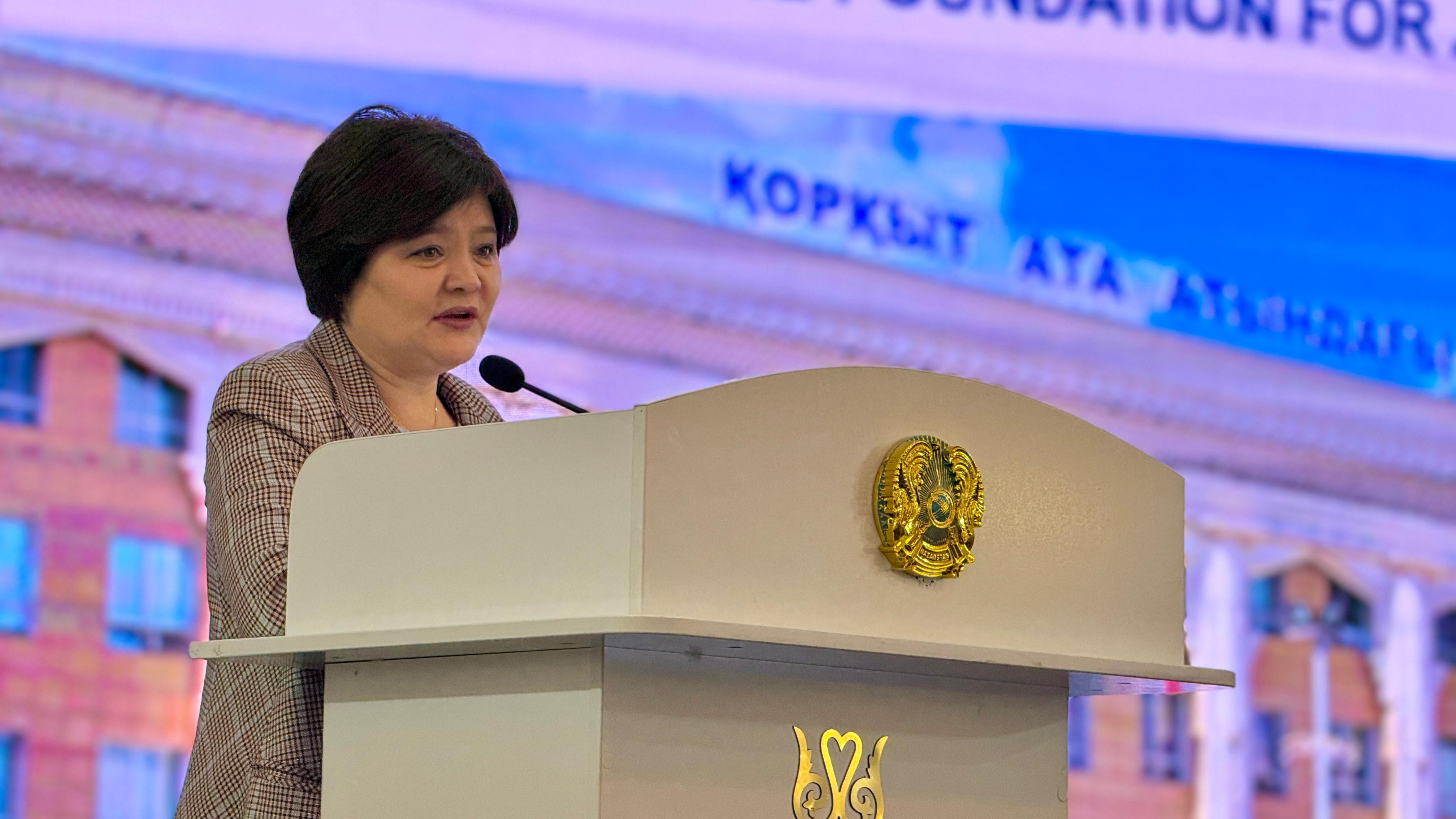
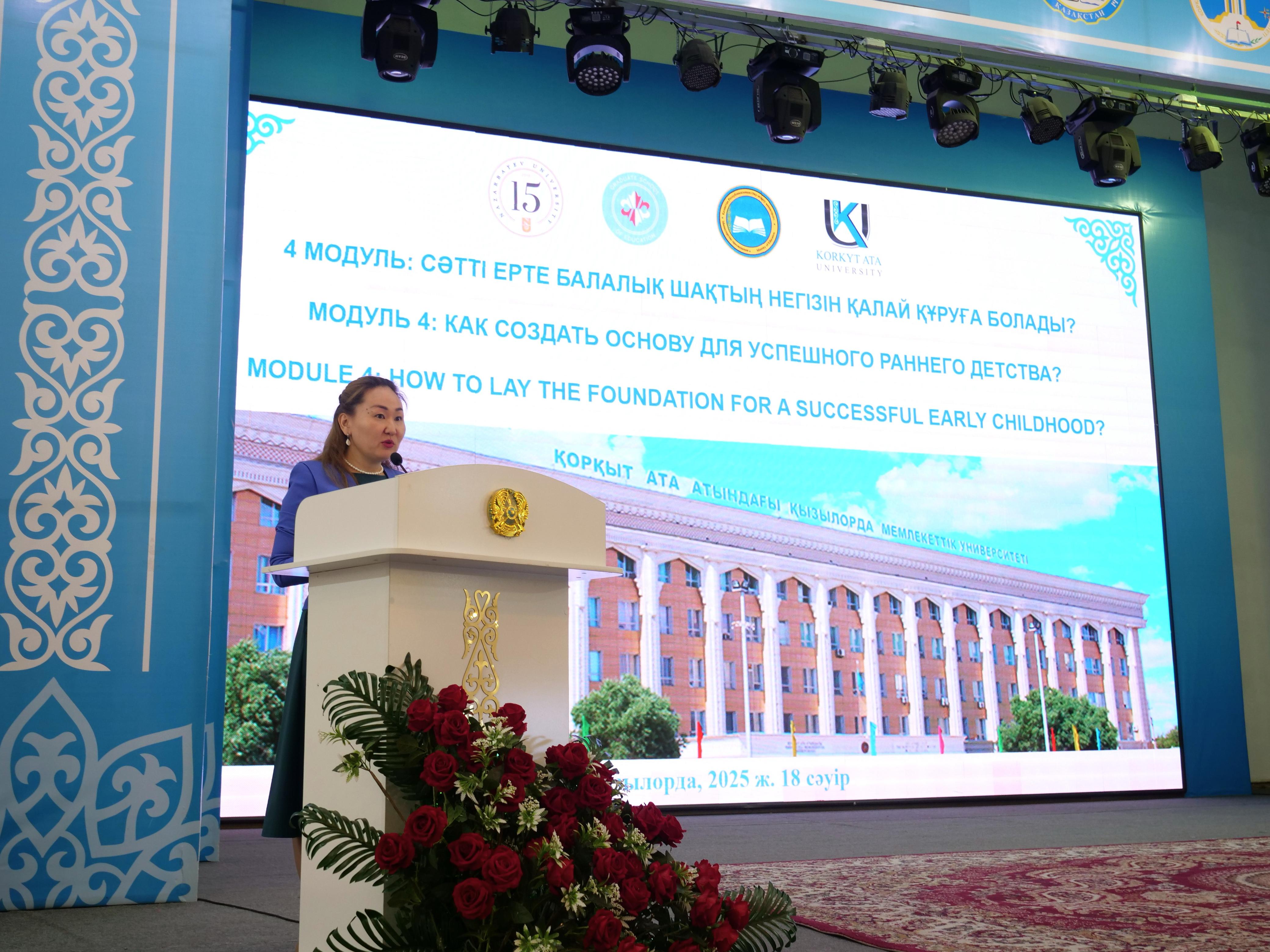
.jpeg)
Manara Adamova, Director of the Department of Preschool Education of the Ministry of Education, delivered an engaging lecture titled “Artificial Intelligence in Preschool Education.” She emphasized the importance of applying AI in early childhood development while grounding it in Kazakh educational values and national traditions. During the lecture, participants were engaged with questions about artificial intelligence, which gave the session a more interactive and socially oriented character.
Drawing connections between AI and Kazakh cultural heritage—such as yurts and traditional household objects— Manara Adamova discussed the distinctive features of AI and current legislative efforts to integrate it into preschool education. She stressed the need to adapt AI to local contexts.
Highlighting the importance of collective effort, Manara Adamova called on educators, parents, and institutions to move beyond isolated approaches and work collaboratively to foster creative and critical thinking among children. She concluded by outlining methodologies for integrating AI into preschool curricula and noted that two major projects for preschool institutions are scheduled for completion by the end of 2025.
An interactive lecture by Maira Kunkozhaeva, Head of the Syr Shuagy Kindergarten in Kyzylorda, sparked significant interest. Her presentation covered the following topics: "Using Artificial Intelligence in the Development and Education of Preschool Children", "Digital Technologies and AI in Education: New Approaches", "AI for Diagnosing the Cognitive and Emotional Development of Children", and "Innovative Technologies Supporting the Intellectual and Physical Development of Children".
During her presentation, Maira Kunkozhaeva illustrated examples of how artificial intelligence is being integrated into the kindergarten’s educational process combining national values with modern technological tools.
.jpeg)
The next part of the event featured a demonstration session by the Syr Shuagy Kindergarten, which began with a dance performance by the children alongside a robot. Seminar participants were then divided into teams, each with a unique name, and took part in various activities involving AI-based programs. Alongside the children, they embarked on an engaging "journey into childhood" using AI technologies.
Nurlan Kulmyrzayev, Director of the AI Institute at Korkyt Ata Kyzylorda University, gave a report titled "AI Platforms for Parental Engagement in Preschool Education in Kazakhstan". He analyzed the advantages and limitations of platforms such as Indigo, ED24.kz, Sakura, and Bilimal.kz, and offered practical recommendations for parents.
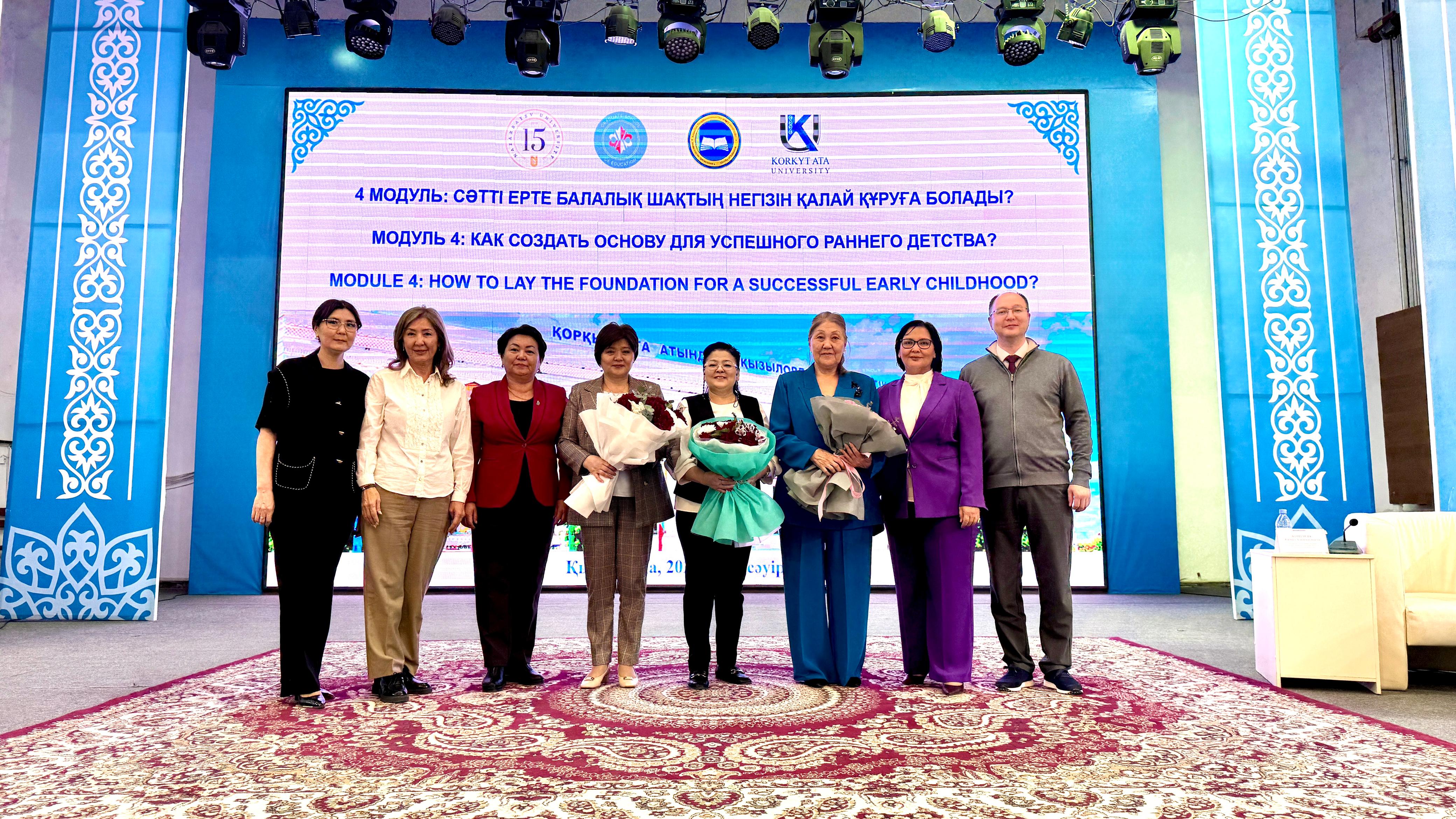
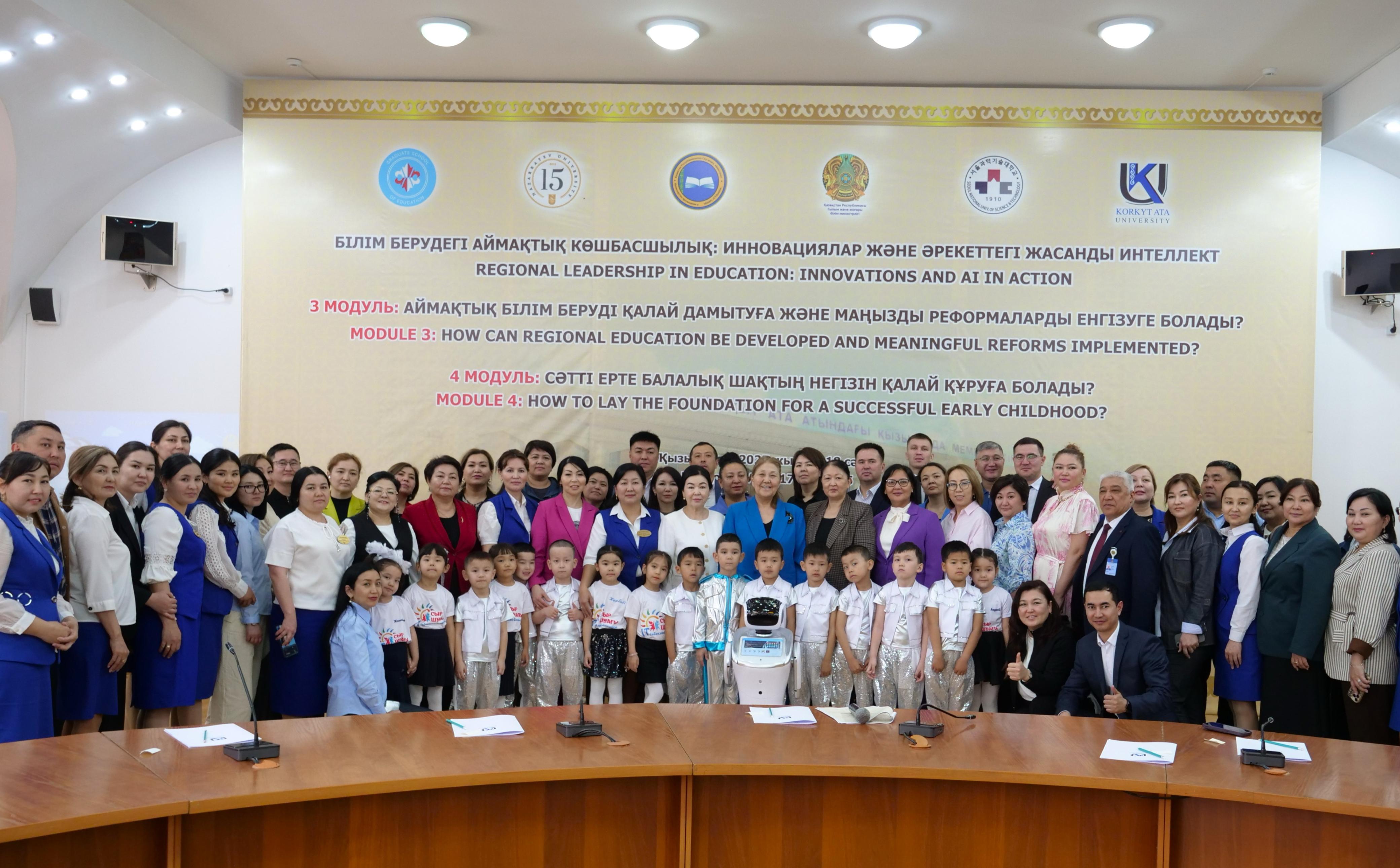
Zhanaris Tubekbayev, Head of the Business Start Entrepreneurial Center, presented on the topic "Kyzylorda Hub Business Incubator". He emphasized that its mission is to unite the region’s innovative projects, startups, investors, and mentors to realize shared ideas. The incubator’s core goals include developing new entrepreneurial knowledge, creating project prototypes, attracting investments, and supporting financial planning and reporting.
Oralbek Abdullaev, a professor at Korkyt Ata Kyzylorda University, delivered a report titled “Using Interactive Educational Platforms Based on Power BI for Data Analysis in the Field of Education.” In his presentation, he analyzed approaches to achieving independent expert solutions, explored the features of data visualization using Power BI, and reviewed methods for utilizing useful digital platforms.
Aybek Orazbakhov, a professor at Korkyt Ata Kyzylorda University, gave a report on “Creating AI Agents to Support Educators and Personalize the Educational Process for Students.” He presented a platform he had developed using artificial intelligence. A key feature of this platform is the integration of an intelligent AI system that streamlines educators’ professional activities and enables personalized learning tailored to students’ individual needs and abilities.
Sofia Khairullakyzy, a master’s student at Korkyt Ata Kyzylorda University, presented the results of her project titled “Development of Creative Abilities and Fine Motor Skills in Preschool Children: Creating Simple Anime Illustrations.” Her research focused on increasing children's engagement with modern visual images and anime-style cartoons.
Galiya Dauletova, Head of the Department of Education Quality Assurance in the Kyzylorda Region under the Ministry of Education of the Republic of Kazakhstan, delivered a report on “Using Technologies to Ensure Transparency and Effective Management in Education.” She provided detailed insights into the types of state control in secondary education, self-assessment documentation, licensing requirements for educational activities, and mechanisms for external quality assessment.
Zhaksygul Toganova, Director of the Higher Pedagogical College named after M. Mametova, gave a report on “Improving Teachers’ Competence in Using Artificial Intelligence in Preschool Education.” She highlighted interactive games created by students using AI tools, emphasizing their role in early childhood education.
At the conclusion of the two-day republican seminar, Beibitkul Karimova, Chairman of the Board – Rector of Korkyt Ata Kyzylorda University, expressed her gratitude to the seminar participants and wished them success.
Center of Korkyt ata Kyzylorda University
Contact phone: 8(7242) 26-21-34
e-mail: media_korkyt@mail.ru
Services available
PLATONUS
platonus.kz
E-univer
https://e-univer.korkyt.kz/
Call center
+7-7242-558877
МООK
МООK (Massive Open Online Lesson)
Megaproject Electronic Library
e-univer.korkyt.edu.kz
Erasmus
erasmus
Schedule of lessons
more...
Science Library
more...

